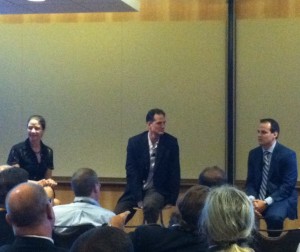Picture your "typical" sports fan - body paint, tailgating, banners on the car, and so on. You can easily imagine that person as a brand evangelist. Now think of someone you know who loves to read. Would you ever put the sports fan and the book lover in the same "brand evangelist" category? It turns out you can and the common thread for making it happen is customer intelligence.

SAS's Hillary Ashton moderated a discussion at the Premier Business Leadership Series between Joe Torczon, Director of Marketing for Scholastic Books and Anthony Perez, Vice President of Business Strategy for the Orlando Magic about turning customers into brand evangelists with customer intelligence.
I learned just how similar book publishing can be to marketing a sports franchise, and interaction beween the panelists made for a great session with plenty of takeaways.
The bottom line is that creating brand evangelists takes into account the customer journey, taking a digital marketing approach, carefully using data and metrics, and striving for the elusive 360-degree view of the customer. Here are the highlights:
The customer journey
Scholastic Books' customers most often are children and adult teachers or parents that also bought Scholastic Books as a child. They also publish the Harry Potter series of books in the United States and other well-known titles, but the bulk of their business is driven by their long-term customer relationships and the affinity they've developed over many years. The Orlando Magic is a professional basketball team franchise that's about 25 years old, and it operates in a young market with a fairly transient market so long-term affinity with customers is still evolving.
Marketing in the digital era
For Scholastic - everything goes. Digital channels have provided growth opportunities, while traditional channels (print) are still a big part of their business. That means they continue to engage customers in whatever channel is their preference - sometimes expensive but always necessary. Across all channels, using customer intelligence allows them to target customers by age range, subject, grade level, regionality and any other relevant factor. Digital formats include apps that enhance the customer experience, as well as content and teaching aide solutions to accompany their book offers. And as Joe put it, they've learned that nobody sits down at their computer to peruse their catalogs - it's all mobile, so now their messaging and formats all need to be mobile-friendly.
The home arena for Orlando Magic is the Amway Center, a state of the art facility with 1,100 flat screen displays that they can control down to the individual unit. Each menu board and concession stand display is also all digital, as the big display hanging above the center of the arena. It provides unprecedented opportunities to tailor the customer experience for the fan and enhance their intended positioning more broadly as an entertainment experience for fans - it's not just about the game. As a result, their fans come to games and have an enhanced experience where they have a good time whether or not the team wins the game. As for mobile, they integrate mobile text messages during games with arena display messaging, but notably have only a 10% opt-in rate for mobile text versus 40-50% for email.
Data, measurement and attribution
From both perspectives (and maybe for all marketers) attribution is an imperfect exercise - that doesn't mean we don't try. The customer journey drives different needs for data collection and use. Scholatic's Torczon candidly shared how he doesn't understand what's the big deal with big data - it turns out that's because Scholastic has had big data for a long time and they're used to it! They keep 10 years of data on every book title sold - which makes perfect sense considering the longevity of their customer relationships and breadth of their nationwide distribution.
Orlando Magic's Perez shared their struggle of dealing with all the noise of big data. On the flip side, they're finding that data from their Wi-Fi network in the arena gives them insight into behaviors during the games previously unavailable because one person often buys tickets for a whole group. That insight helps them deliver the total entertainment experience they want the fan to have. So I ask - isn't that what it's all about?
Getting to the 360-view of the customer
From what both panelists described, it sounds like digital data is what will help them get to full customer views. In the case of the Orlando Magic, they've found work-arounds to the common situation of one person buying multiple tickets. They're also managing around the drawbacks of paper tickets and peoples' ability to transfer them by refraining from mailing paper tickets to season ticket holders. One tangible customer benefit with electronic ticketing is the possibility for getting in-game upgrades for people to get better seats during a game when they want. At Scholastic, getting email data has helped them get closer to full customer profiles, as has their use of loyalty programs, but they're finding that up to 15% of teachers are either changing positions or leaving the profession altogether.
In sum, readers and fans are all customers - and it's when they're treated like valued customers that they become brand evangelists. Muggles who like Harry Potter and body-painted sports fans are already enthusiastic - but they become brand evangelists when we can channel that enthusiasm into loyalty and advocacy. And that's how customer intelligence can grow your business - ask us about it. We can help!

2 Comments
Un post limpio y con mucha información me gusta y voy a compartirlo ahora mismo excelente pasare para ver sus nuevos aportes.
İGracias, Valentín! Muy amable. Continúe siguiéndonos para otros puntos de vista sobre marketing.
Saludos, JB